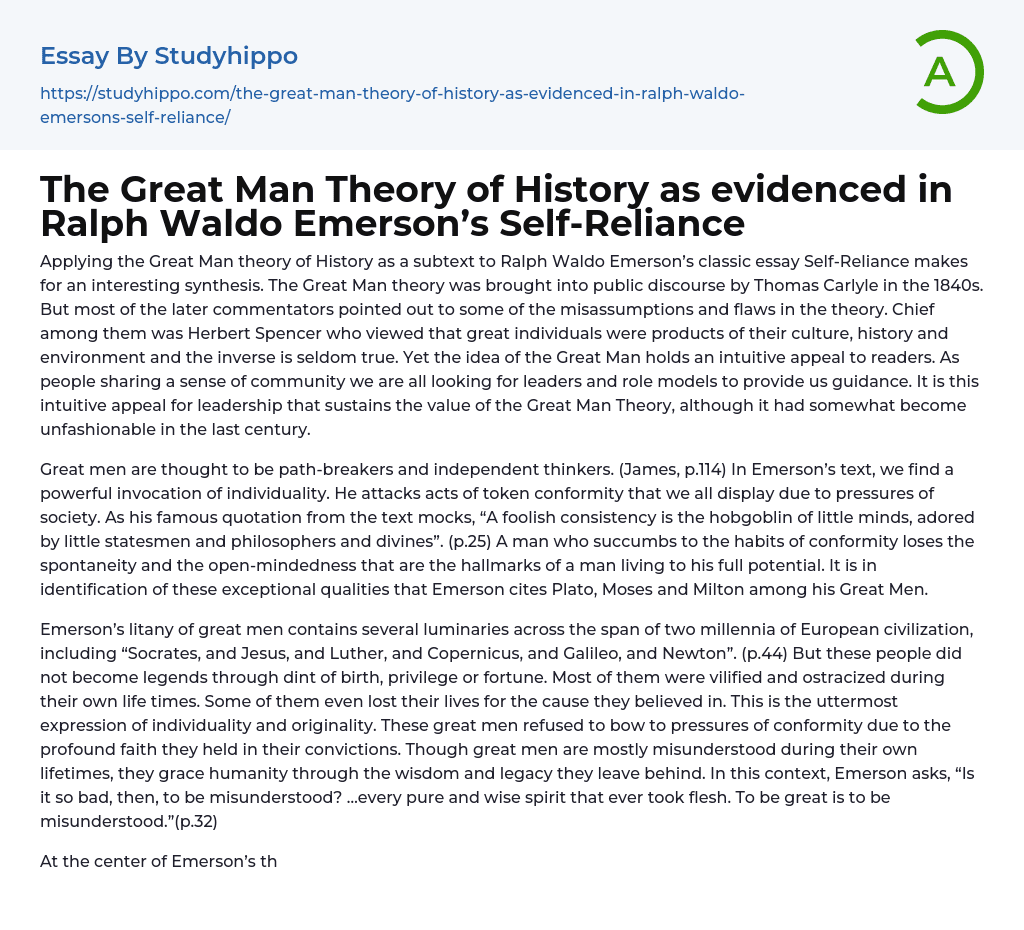

The Great Man Theory of History as evidenced in Ralph Waldo Emerson’s Self-Reliance Essay Example
Applying the Great Man theory of History as a subtext to Ralph Waldo Emerson’s classic essay Self-Reliance creates an intriguing synthesis. This theory, introduced by Thomas Carlyle in the 1840s, has become a part of public discourse.
However, many subsequent commentators criticized the theory, noting several misunderstandings and weaknesses. One prominent critic, Herbert Spencer, argued that influential individuals are largely shaped by their culture, history, and environment, rather than the other way around. Nonetheless, the concept of the Great Man remains appealing to readers. As members of a community, we all desire leaders and role models who can offer us guidance.
The Great Man Theory's value is sustained by an intuitive appeal for leadership, despite being out of fashion in the last century (James, p.114). Great men are believed to be innovators and original thinkers. Emerson's text expresses a strong emphasis on indiv
...iduality by criticizing the tendency to conform to societal pressures. He sarcastically states, "A foolish consistency is the hobgoblin of little minds, adored by little statesmen and philosophers and divines" (p.25). When a man conforms, he loses the spontaneity and open-mindedness that characterize someone who is truly fulfilling their potential.
Emerson includes Plato, Moses, and Milton in his list of Great Men, recognizing their exceptional qualities. He also mentions other luminaries such as Socrates, Jesus, Luther, Copernicus, Galileo, and Newton from different periods of European civilization. Despite their legendary status today, these individuals did not achieve greatness due to their social status or wealth. In fact, many of them faced criticism, rejection, and even death for their beliefs.
This is the ultimate manifestation of personal uniqueness and creativity. These remarkable individuals refused to conform to societal
pressures because they firmly believed in their own convictions. Although such great individuals are often misunderstood while they are alive, they bless humankind with their wisdom and lasting impact. In this regard, Emerson poses the question, "Is it really so terrible to be misunderstood? ... every sincere and enlightened soul that has ever existed."
To be misunderstood is what defines greatness, according to Emerson (p.32). The core of Emerson's argument revolves around three concepts: skepticism towards societal norms, acknowledging one's own genius, and the importance of self-value. These attributes also exemplify the qualities possessed by Great Men, as stated in the theory (Frinin, p.96). For instance, influential individuals who have shaped civilization were driven by strong motivation, visionary thinking, and self-confidence. Among these characteristics, it is self-confidence that serves as the foundation and reinforcement for the others. As self-confidence is rooted in individuality, Emerson's statement that "envy is ignorance, imitation is suicide" is particularly perceptive. By examining the lives of great historical figures, we can witness how this mindset permeated every significant moment they experienced.
Both rulers such as Napoleon Bonaparte and Queen Elizabeth, as well as scientists, philosophers, and intellectuals, all share a belief in their convictions. Emerson expresses this sentiment himself, stating, "My life is not an apology, but a life. It is for itself and not for a spectacle. I much prefer that it should be of a lower strain, so it be genuine and equal, than that it should be glittering and unsteady" (p.26). The theory also suggests that courage is another virtue possessed by great historical figures (Frinin, p.96). In line with this concept, Emerson's text implies the importance of courage in
living a remarkable life.
Emerson echoes the importance of practicing valor in our daily lives and expresses concern over the lack of courage and honesty in society. He believes that fear inhibits us from expressing our true thoughts and being true to ourselves. Emerson points out that we often only partially express ourselves and feel shame for not fully embracing our divine potential. He warns that God will not support those who are cowardly in their self-expression. Therefore, Emerson emphasizes the connection between human action and divine judgment.
Works Cited:
- Ralph Waldo Emerson, Self-Reliance, A Classic Essay by Emerson. Excerpted from Essays, First Series. Published August 1st 2007 by Arc Manor.
- James, W. 2005 [1880]. Great Men and Their Environment. Kila, MT: Kessinger Publishing
- Grinin, Leonid 2010. The Role of an Individual in History: A Reconsideration. Social Evolution & History, Vol. 9 No. 2 (pp. 95–136).
- Values of Life essays
- Ethical dilemma essays
- Normative Ethics essays
- Virtue Ethics essays
- Belief essays
- Deontology essays
- Moral essays
- Virtue essays
- Work Ethic essays
- Russian Empire essays
- Ancient Greece essays
- British Empire essays
- Historical Figures essays
- Nazi Germany essays
- Roman Empire essays
- War essays
- Revolution essays
- 19Th Century essays
- Historiography essays
- History of the United States essays
- 20Th Century essays
- World History essays
- Vikings essays
- Declaration of Independence essays
- Civilization essays
- Evidence essays
- Genocide essays
- Colonialism essays
- Rebellion essays
- 1960S essays
- 1920S essays
- 1950S essays
- Letter from Birmingham Jail essays
- Louisiana Purchase essays
- The Columbian Exchange essays
- World Hunger essays
- What is History essays
- Bravery essays
- Gilded Age essays
- Vladimir Lenin essays
- Alexander The Great essays
- Sparta essays
- Victorian Era essays
- Henry v essays
- Stonehenge essays
- Frederick Douglass essays
- Mahatma Gandhi essays
- Joseph Stalin essays
- Geert Hofstede essays
- George Eliot essays



